The Theology of Missions
The Theology of Missions
The Theology of Missions
You also want an ePaper? Increase the reach of your titles
YUMPU automatically turns print PDFs into web optimized ePapers that Google loves.
5 Biblical <strong>The</strong>ology <strong>of</strong> Contextualization<br />
38-39, 43-44). 5 At the conclusion <strong>of</strong> the Sermon on the Mount one reads the<br />
words, “<strong>The</strong> crowds were amazed at His teaching; for He was teaching them<br />
as one having authority, and not as their scribes.” 6 Jesus did not teach like the<br />
scribes did. To support their statements they would say, “Rabbi so-and-so<br />
has said,” or “Rabbi ben–Jonah has said,” but Jesus said, “I say to you.” And<br />
in Matt 28:18 the resurrected Christ, who, according to Rom 1:4, “was declared<br />
[to be] the Son <strong>of</strong> God with power by the resurrection from the dead,<br />
according to the Spirit <strong>of</strong> holiness,” issued this command. Christ is God; he<br />
is the Son <strong>of</strong> God; and as such, he possesses all authority in heaven and on<br />
earth. <strong>The</strong>refore, in light <strong>of</strong> the fact that Christ is God and has all authority,<br />
he is able to commission his church.<br />
Christ commanded his church to “Go and make disciples.” <strong>The</strong> main<br />
verb in the text is the aorist imperative μαθητεύσατε (“make disciples”).<br />
Aorist imperatives, in general, convey a sense <strong>of</strong> urgency and immediacy<br />
<strong>of</strong> action. <strong>The</strong> main verb μαθητεύσατε is modified by the aorist participle,<br />
πορευθέντες; not “as you go,” as is frequently explained, but “Go and make<br />
disciples.” 7 Πορευθέντες is an attendant circumstance participle; that is, the<br />
action “go,” in some sense, is coordinate with the action <strong>of</strong> the finite verb,<br />
“make disciples.” 8 And as such, the participle takes on imperatival force as<br />
well. Further, the action <strong>of</strong> the participle is “something <strong>of</strong> a prerequisite before<br />
the action <strong>of</strong> the main verb can occur.” 9 That is to say, no making <strong>of</strong><br />
disciples will take place unless you go: “Go and make disciples!”<br />
<strong>The</strong> object <strong>of</strong> the main verb “make disciples” (μαθητεύσατε) is πάντα τὰ<br />
ἔθνη (“all the nations”)—every nation on the face <strong>of</strong> the earth, every people<br />
group on the planet—red and yellow and black and white, all are precious<br />
in his sight. Followers <strong>of</strong> Jesus are to make disciples <strong>of</strong> everyone everywhere,<br />
regardless <strong>of</strong> color or locale. Thus, the Great Commission involves not only<br />
sharing the gospel (i.e., not just missions and evangelism: “Go”), but another<br />
great responsibility: “make disciples.” A disciple is basically a follower <strong>of</strong><br />
Christ and his word/teachings. He is a learner, adherent, and follower <strong>of</strong> the<br />
Lord Jesus Christ, someone who seeks to spread the gospel and its teachings<br />
to others. Believers in Jesus are to train those with whom they have shared<br />
the gospel and led to the Lord. <strong>The</strong>y are to do “follow-up.” <strong>The</strong>y are not to<br />
leave converts to Christ unchurched, untrained, and undiscipled.<br />
<strong>The</strong> text contains two participles <strong>of</strong> means, βαπτίζοντες and διδάσκοντες<br />
(“baptizing” and “teaching”), that define the action <strong>of</strong> the main verb “make<br />
5<br />
Emphasis added. Unless otherwise noted, translations <strong>of</strong> the biblical text are my own.<br />
6<br />
Emphasis added.<br />
7<br />
Emphasis added.<br />
8<br />
Though Daniel B. Wallace, Greek Grammar Beyond the Basics (Grand Rapids:<br />
Zondervan, 1996), 640, 645, places the attendant circumstance participle “go” into the<br />
“disputed examples” category in the latter book, he rightly presents it as a clear example in<br />
his abridged <strong>The</strong> Basics <strong>of</strong> New Testament Syntax: An Intermediate Grammar (Grand Rapids:<br />
Zondervan, 2000), 280-81.<br />
9<br />
Wallace, Basics <strong>of</strong> NT Syntax, 280.

















